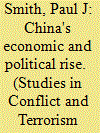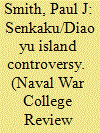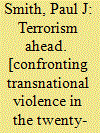|
|
|
Sort Order |
|
|
|
Items / Page
|
|
|
|
|
|
|
| Srl | Item |
| 1 |
ID:
086838


|
|
|
|
|
| Publication |
2009.
|
| Summary/Abstract |
Recent naval ship visits and exchanges of goodwill between China and Japan suggest an improvement in the two countries' bilateral relationship, which had been steadily deteriorating since the late 1990s. In the longer term, however, Sino-Japanese relations will likely be tested or constrained by five key sets of issues: (1) territorial and resource disputes, (2) nationalism and issues of mutual antipathy, (3) Taiwan's political status, (4) the rapid rise of China's military power, and (5) the U.S.-Japan security alliance. The manner in which these issues are managed or resolved will likely play a major role in shaping the Sino-Japanese relationship and thus the overall geopolitical environment in East Asia. A key complicating factor in the relationship, however, is the persistence of divergent worldviews: Chinese leaders appear to be more consistently persuaded by realist notions of international politics, whereas Japanese leaders tend to favor liberal-institutionalist values. The two countries may use these different lenses to view the same incident or issue, potentially creating misunderstanding and miscalculation.
|
|
|
|
|
|
|
|
|
|
|
|
|
|
|
|
| 2 |
ID:
109077


|
|
|
|
|
| Publication |
2011.
|
| Summary/Abstract |
The U.S. Navy SEAL raid in Abbottabad, Pakistan, and Islamabad's subsequent turn toward China have highlighted one of the most remarkable legacies of the Cold War: the persistence of a strategic triangle composed of China, Pakistan, and the United States. Throughout much of the Cold War, China and the United States competed to keep Pakistan within their particular sphere of influence, while Pakistan deftly took advantage of the subtle power struggle to improve its security profile vis-à-vis India. Despite persistent competition, the nations of the strategic triangle enjoyed three major convergence points: (1) the 1969-71 period, when Pakistan acted as a conduit for secret talks between Beijing and Washington, which subsequently led to mutual coordination during the 1971 Indo-Pakistan war; (2) the decade following the Soviet Union's invasion of Afghanistan in 1979; and (3) the years following the 9/11 attacks in the United States, when global focus turned to Afghanistan and terrorism. This third convergence around terrorism is particularly salient, as Pakistan is increasingly viewed globally as both a source of terrorist activity and a victim of terrorist violence. In the long term, the strategic triangle may act as a modulating force that may prevent instability within nuclear-capable Pakistan, as well as constrain activities by certain Pakistani state organs that may be linked to the proliferation of weapons of mass destruction and clandestine support for militant organizations.
|
|
|
|
|
|
|
|
|
|
|
|
|
|
|
|
| 3 |
ID:
090202


|
|
|
|
|
| Publication |
2009.
|
| Summary/Abstract |
As a rising power in the international system, China is discovering that, like many states before it, the ascendancy to great power status sometimes entails significant terrorism risks. Recent attacks against Chinese nationals (or commercial interests) in Africa, Central Asia, and South Asia appear to reflect this trend. In addition, since the early 1990s, China has endured a series of violent attacks emanating from (or associated with) its restive northwest Xinjiang Uighur Autonomous Region (XUAR). Beijing's search for energy security and its associated commercial activities in the Middle East, Africa, South Asia and Central Asia suggests that terrorism risks for China may increase in the future. In the wake of the 9/11 attacks in the United States and U.S.-Chinese counterterrorism cooperation prior to and during the 2008 Olympic Games, Washington and Beijing have discovered they have many common interests in countering the global threat of terrorism. However, for long-term cooperation to be sustained, the two countries must overcome or manage various disagreements on issues related to terrorism and the larger challenges associated with geopolitical competition. If these differences can be mitigated or resolved, China and the United States may be ideally positioned to establish a powerful and long-term bulwark against international terrorism and the instability that it promotes.
|
|
|
|
|
|
|
|
|
|
|
|
|
|
|
|
| 4 |
ID:
082280


|
|
|
| 5 |
ID:
133388


|
|
|
|
|
| Publication |
2013.
|
| Summary/Abstract |
On 11 September 2012, the Japanese government signed a contract worth 2.05 billion yen ($26.1 million) with Kunioki Kurihara, a private businessman, to purchase three of the five main islands that constitute the Senkaku/ Diaoyu Island group, an action that effectively nationalized the islands.1 Ironically, the government purchase was designed to head off more ambitious moves by Tokyo's governor (?????), Shintaro Ishihara, to purchase the islands with cash collected in a national fund-raising campaign. Ishihara, known for his nationalistic views, had told an American audience in April 2012 that the "Senkaku Islets will be purchased by the Tokyo Metropolitan Government . . . [and] we will do whatever it takes to protect our own land."2 Not surprisingly, the Chinese government viewed Japan's island-purchasing activities, whatever their motivations or sources, as severe provocations that required a firm and immediate response.
|
|
|
|
|
|
|
|
|
|
|
|
|
|
|
|
| 6 |
ID:
080221


|
|
|
|
|
| Publication |
Armonk, M E Sharpe, 2008.
|
| Description |
xiv, 258p.
|
| Standard Number |
9780765619884
|
|
|
|
|
|
|
|
|
|
|
|
Copies: C:1/I:0,R:0,Q:0
Circulation
| Accession# | Call# | Current Location | Status | Policy | Location |
| 053050 | 363.32516/SMI 053050 | Main | On Shelf | General | |
|
|
|
|
| 7 |
ID:
123438


|
|
|
|
|
| Publication |
2013.
|
| Summary/Abstract |
For more than six decades, the geopolitics of South Asia have been shaped by a symbiotic and triangular relationship involving India, Pakistan, and China. A succession of interstate conflicts has created two fundamental and enduring security structures, one rooted in India's partition and subsequent Indo-Pakistan wars (the "1947 structure") and the other in a persistent and often antagonistic Sino-Indian rivalry, including a border conflict in 1962 (the "1962 structure"). During the Cold War, exogenous powers, including the United States and Soviet Union, sought to use or manipulate these structures to advance their political objectives. In the long term, however, the 1962 structure is likely to become the dominant security architecture in the region, a trend that can be attributed to China's growing military and economic power, Beijing's increasingly intimate relationship with Islamabad, and the Chinese navy's expanding reach into the Indian Ocean.
|
|
|
|
|
|
|
|
|
|
|
|
|
|
|
|
| 8 |
ID:
017657


|
|
|
|
|
| Publication |
Autumn 2000.
|
| Description |
77-91
|
|
|
|
|
|
|
|
|
|
|
|
|
|
|
|
|
|
|
|
|